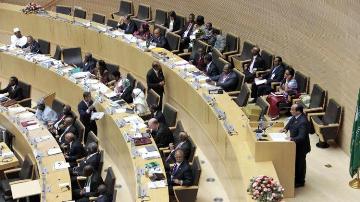AU appalled over UNSC failure to defer ICC cases of Sudan, Kenyan leaders
By Tesfa-Alem Tekle
February 3, 2014 (ADDIS ABABA) – The African Union (AU) has expressed dismay after the United Nations Security Council (UNSC) disregarded pan-African body’s requests to defer the ICC trials of sitting African head of states.

The AU was referring to the cases of Kenya’s president Uhuru Kenyatta and his deputy William Ruto who are accused by the International Criminal Court of committing crimes against humanity.
They are accused of being behind the post-presidential election violence in 2007 which claimed the lives of over 1,000 people.
Kenyatta and Ruto have both denied the charges.
With regard to Sudanese president, it said AU’s request to the UN Security Council to defer the trials against Sudanese president Omar Al Bashir “has not been acted upon to date”.
Bashir is charged of committing war crimes, crimes against humanity and genocide during the conflict in Darfur.
The 54-member continental bloc urged all member states to “speak with one voice” to thwart the ICC proceedings against sitting African presidents.
“African states parties should comply with African Union decisions on the ICC and continue to speak with one voice.”
The AU said the united stance is to ensure that the African proposals calling for amendment on the Rome Statute, in accordance with Article 121 of the Statute are considered by the Assembly of States Parties (ASP) as well as the issue is inscribed on the agenda by the forthcoming sessions of the to the Rome Statute.
Botswana is the only African country which protested against the Union’s decision calling for a united stand against the ICC.
“There is an imperative need for all member states to ensure that they adhere to and articulate commonly agreed positions” said the AU statement.
African leaders have been accusing the ICC of double standards in their dealings with war crime suspects, arguing that it is targeting Africans while ignoring suspects in other part of the world.
Among others, African politicians cite that the ICC did nothing for the crimes former US president, George Bush, allegedly committed in Iraq.
The ICC has opened investigations into eight cases, all of which are in Africa including Uganda, the Democratic Republic of the Congo (DRC), Central African Republic (CAR), Darfur, Kenya, Libya, Côte d’Ivoire and Mali.
Five of the eight cases were referred voluntarily by the African governments in question; two through a UNSC resolution supported by all but one African member in the council at the time and the Kenyan case was opened at the ICC prosecutor’s request.
The ICC intervened after the Kenyan parliament shot down several attempts to establish a local tribunal in accordance with a power-sharing agreement brokered by former UN secretary-general Kofi Annan.
The ICC’s decision also followed calls from a number of MPs, who said they wanted the cases investigated at The Hague.
The Africa Union in a summit last year said the ICC process conducted in Africa was flawed and in a special meeting it convened the union considered about pulling out from ICC.
Thirty four African countries are signatories to the Rome Statute, the ICC’s founding charter.
(ST)
